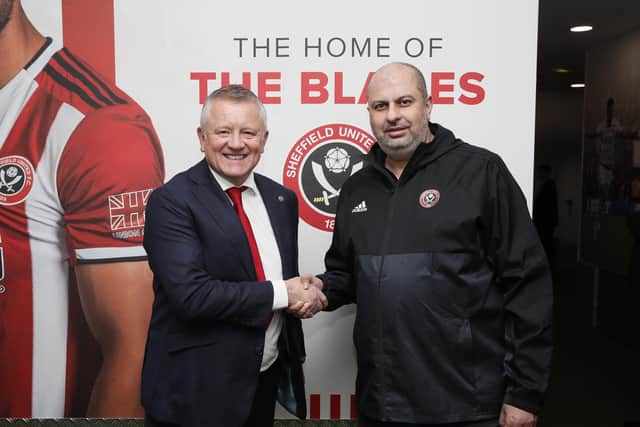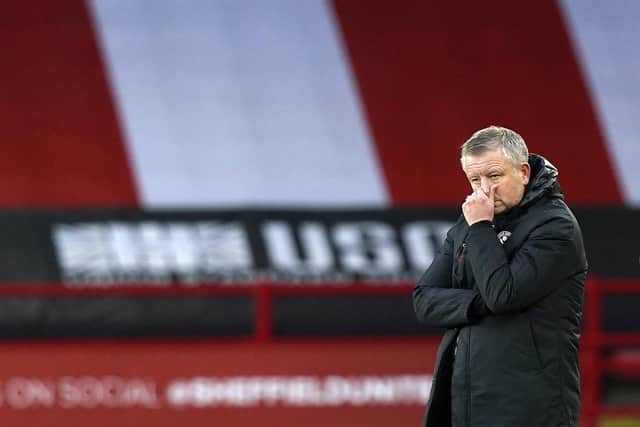The rise and the fall of Chris Wilder at Sheffield United and the reasons behind his departure
and live on Freeview channel 276
Chris Wilder for many the greatest manager in Sheffield United’s history, is leaving. Following the deterioration of his relationship with Prince Abdullah bin Musa’ad bin Abdulaziz Al Saud and members of the owner’s inner circle, an acrimonious divorce is inevitable.
Wilder is poised to leave United at the bottom of the Premier League table following a run of four wins, two draws and 22 defeats this season. Results have inevitably taken their toll on the 53-year-old, who cut a disconsolate figure after last weekend’s loss to Southampton. But his reign has been one of almost unparalleled success, taking charge of a club flailing around in League One before leading it back into the top-flight two summers ago. Wilder’s record, before this autumn’s dramatic downturn in fortune, read P184 W 95 D44 and L45 - achieved playing an exhilarating brand of football which captured the imagination of everyone who witnessed it.
Advertisement
Hide AdAdvertisement
Hide AdRather than being a reaction to United’s latest set-back ahead of Sunday’s visit to Leicester City, Wilder is known to have been concerned about his position for some time; long before Prince Abdullah issued a vote of confidence during an interview with one of the competition’s rights-holders during the build-up to Christmas. Although the show of support was well-intentioned, and designed to remove speculation about the former Oxford and Northampton Town chief’s position, The Star understands Wilder would have actually preferred his employers to remain silent. It explains why, despite being attributed to United’s performance at St Mary’s earlier that afternoon, he declined several invitations to discuss the statement during his post-match interviews; preferring to focus purely on footballing matters instead, including identifying the reasons behind a “passive” and “utterly disappointing” display.


Results and performances have undoubtedly had a bearing on Wilder’s situation. Wins over Chelsea, Tottenham Hotspur and Wolverhampton Wanderers in July apart, United have looked a pale shadow of the side which had risen to sixth in the table when the country first entered lockdown in March since returning to action last summer.
But the role politics have played in his departure must not be ignored or underestimated either. Indeed, they are arguably the most important reason why his reign is set to end prematurely.
Wilder’s frustration with recruitment policy, and what he regarded as the club’s failure to progress at the same pace off the pitch as it has on it, has seeped into the newspapers in recent weeks.
Advertisement
Hide AdAdvertisement
Hide AdWith Prince Abdullah and his board committing to spend more than £60m on Oli McBurnie, Sander Berge and Rhian Brewster alone - the latter arriving for a record £23.5m fee in September - that is unlikely to have gone down well with United’s hierarchy.


Nevertheless, with the Saudi Arabian and members of his inner circle insisting they were providing the maximum financial support possible, Wilder began to grow increasingly frustrated during the close season when a number of what he regarded as ‘natural’ United signings turned-up elsewhere, despite all being considered for moves to South Yorkshire. They included Ollie Watkins and Matty Cash, now of Aston Villa, Watford’s Andre Gray and Fulham’s Terence Kongolo.
Jeff Hendrick was also approached when he parted company with Burnley although Wilder and his coaching staff accepted the inevitable when Newcastle entered the bidding. Hamza Choudhury, who could feature against United at the KP Stadium, was a recent loan target. Likewise Jesse Lingard and Ben Davies, now of West Ham and Liverpool respectively.
When he reflects upon his time in charge, Wilder might decide he showed too much loyalty to some members of a squad he led from the third to the first tier of English football. A few of its longest serving members have been woefully inconsistent as United slid deeper and deeper into trouble. It is a fact of life that several of those who have recently struggled for opportunities will view this as a chance to reassert their authority. But others are utterly dismayed by recent developments.
Advertisement
Hide AdAdvertisement
Hide AdOften painted as a marriage made in heaven - Wilder, who made more than 120 appearances for United as a player has also followed them since childhood - his relationship with his employers has never been entirely serene. Indeed, there have been numerous spats, arguments and disagreements. Some of them spilled into the public arena. Those involved were initially able to keep a lid on others. But eventually, inevitably, the pressure has told. Insiders report members of the board were privately furious, summoning members of staff to a series of Zoom meetings, when Wilder recently confessed he didn’t know if he would remain in charge next term.
At the end of his second season at the helm, which saw United just miss out on a place in the Championship play-offs, Wilder intimated he was prepared to walk away unless certain conditions were met. Sunderland, who had just been taken over by his former colleague Stewart Donald, were ready to offer him an escape route from the boardroom war between Prince Abdullah and his former co-owner Kevin McCabe, who later lost control of the club following a High Court hearing. With neither man wanting to be portrayed as the one who had forced Wilder out, a sort of truce was called. However, there were suspicions that negotiations before the first of two contract extensions he signed were more problematic than painted at the time - with changes to certain clauses the source of much bickering behind the scenes. Wilder put pen to paper on another in January, as United challenged for a place in Europe.
Inevitably, Donald was not the only person to express an interest in luring Wilder away. Both before and after he was named as manager of the year by the LMA in 2019, numerous teams contemplated attempting to exploit the uncertainty sweeping through the corridors of power at Bramall Lane. West Bromwich Albion, Stoke City and Middlesbrough are among them according to several influential figures within the sport. But Wilder, despite being urged not to by some of his closest confidants, always remained faithful - even when his stock was at its highest 12 months ago.
In stark contrast to some of his counterparts elsewhere in the division, Wilder likes to micro manage all aspects of his team’s operations. The academy, where he was a driving force behind the appointments of Jack Lester and Paul Heckingbottom as head and under-23’s coach respectively, travel plans and even the design of the second and third strips were all covered in his fingerprints. It is a habit, when he returns to work, Wilder might be forced to kick as the parameters of his profession begin to change.
Advertisement
Hide AdAdvertisement
Hide AdHis successor will not enjoy the same influence which, as they attempt to win over a fan base dismayed by recent events, might actually be a good thing. Replacing Wilder in the hearts and minds of United’s supporters will be a full time job in itself.